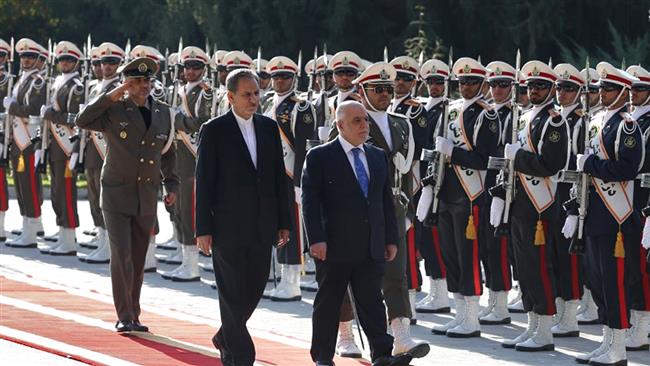

Iraqi Prime Minister Haider al-Abadi is on an official visit to the Iranian capital, Tehran, for talks with the neighboring country’s high-ranking officials on issues of bilateral and regional significance.
The Iraqi premier was officially welcomed by Iranian First Vice-President Es’haq Jahangiri at the Saadabad Cultural and Historical Complex in Tehran on Thursday.
He arrived in the Iranian capital on Wednesday following a visit to Turkey.
During his one-day trip, the Iraqi premier is scheduled to meet with Leader of the Islamic Revolution Ayatollah Seyyed Ali Khamenei, President Hassan Rouhani and Parliament (Majlis) Speaker Ali Larijani.
On Wednesday, the office of Abadi announced in a statement that the Iraqi premier’s visits to Turkey and Iran were part of a regional tour, which also took him to Saudi Arabia, Jordan and Egypt.
According to Iraqi News, Abadi said during his weekly ministerial meeting that the visits to Turkey and Iran would “convey Iraq’s vision of the region’s future.”
During a meeting with Abadi following the welcoming ceremony, Jahangiri reiterated Iran’s support for Iraq’s territorial integrity, saying the Iraqi government has so far managed to foil the plots to disintegrate the country.
“Tehran has been standing by the Iraqi federal government since the start of the referendum issue and we told the Turkish authorities that we should work in coordination with the Iraqi federal government,” said Jahangiri.

He was referring to the controversial referendum held late last month in Iraq’s northern Kurdistan region in defiance of the central government, which slammed the vote as unconstitutional.
The Iraqi government responded to the referendum by taking a number of punitive measures, including a campaign to seize back positions held by Kurdish forces since 2014, when they joined the fight against Daesh terrorists.
Under criticism from Iraq and the entire international community, the Kurdish leadership has now offered to suspend the results of the vote and engage in dialog with the central government, but Baghdad wants the results to be fully canceled.
Jahangiri further stressed that all Kurds residing in Iraq are considered Iraqi citizens and should enjoy all legitimate rights.
Abadi, for his part, said that all sides need to work to prevent the disintegration of countries in the region, adding, “We should make great efforts to develop relations and seek common interests.”
Referring to the Kurdish plebiscite, Abadi said that the vote did not have international support, and that the Israeli regime remained the only voice backing the secessionist move.
The Iraqi premier further highlighted the gains made by the army and volunteer forces in the final stages of anti-Daesh operations at home, saying the “liberation-seeking campaign” has strengthened Iraq’s unity and integrity.
The Iraqi prime minister said that an effective campaign against terrorist groups necessitates coordination and cooperation among all regional countries since the Takfiri groups may pose security threats to any country.
The two sides also exchanged views on the expansion of bilateral relations between the two nations.







